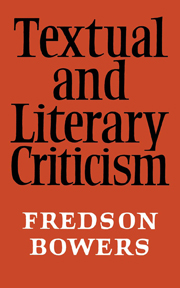IV - Principle and Practice in the Editing of Early Dramatic Texts
Published online by Cambridge University Press: 15 September 2009
Summary
The nineteenth-century editors of Elizabethan drama did not invent the modernised general-purpose reading edition: they were in the direct line of inheritance from the Shakespearean editors headed by Rowe, Pope, Theobald, and Malone. It would seem that the earliest editors never considered any other procedure. Indeed, the editorial ‘purifying’ (i.e. emending and modernising) of late sixteenth- and early seventeenth-century texts as represented by Shakespeare was only the natural carrying-forward, with some refinement, of Elizabethan commercial reprint practice, whereby each new edition became in effect a modernisation. Nor were printing-house editors unknown in the seventeenth century. The Shaaber–Black inquiry into the texts of the Second, Third, and Fourth Folios indicates quite clearly that the editing of Shakespeare did not begin with Rowe.
Various reasons may be assigned for this eighteenth- and nineteenth-century editorial ideal of the reading edition. The editing of the classics—which profoundly influenced the treatment of the vernacular—dictated modernisation and the flexible, eclectic treatment of texts. Also, the general distrust then prevalent of the conditions under which Elizabethan dramatic texts had found their way into print did not encourage respect for the precise forms in which these texts had been preserved in the extant documents. And, finally, the distinction had not yet developed between the general and the critical or scholarly reader. Although cultivated men were interested in the vernacular literature of the past, it had not yet become the prey of professional academic inquiry.
- Type
- Chapter
- Information
- Textual and Literary Criticism , pp. 117 - 150Publisher: Cambridge University PressPrint publication year: 1959



